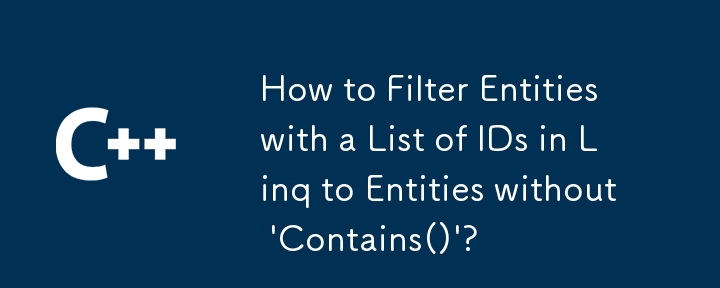

Linq to Entities: Alternative for 'Contains()' Using Extension Method
The 'Contains()' method is not directly supported in Linq to Entities, posing a challenge when filtering entities based on a list of IDs. To address this limitation, an alternative approach using an extension method can be employed.
Solution:
The 'WhereIn()' extension method provides a workaround for 'Contains()' by translating the comparison to a series of 'Equals()' expressions. This extension method can be implemented as follows:
<code class="csharp">public static IQueryable<TEntity> WhereIn<TEntity, TValue>
(
this ObjectQuery<TEntity> query,
Expression<Func<TEntity, TValue>> selector,
IEnumerable<TValue> collection
)
{
// ... implementation details omitted ...
}</code>Usage:
The 'WhereIn()' method can be used to filter entities based on a collection of IDs:
<code class="csharp">List<long?> txnIds = new List<long?>();
// Fill txnIds
var q = from t in svc.OpenTransaction
where txnIds.WhereIn(t => t.OpenTransactionId)
select t;</code>Alternatively, if the collection of IDs is static, it can be provided directly to the extension method:
<code class="csharp">var q = context.Contacts.WhereIn(c => c.Name,
"Contact1",
"Contact2",
"Contact3",
"Contact4"
);</code>Note:
In Entity Framework versions 4 and above, the 'Contains()' method is supported directly, eliminating the need for the workaround presented here.
The above is the detailed content of How to Filter Entities with a List of IDs in Linq to Entities without \'Contains()\'?. For more information, please follow other related articles on the PHP Chinese website!




